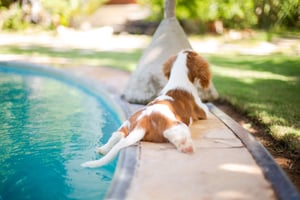Puppies are playful and curious creatures, but their biting can be a nuisance. To help keep your...
How to Stop a Puppy From Biting: Tips and Tricks
Having a new puppy can be a great joy, but it can also be a challenge. If your pup is biting, you need to know how to stop it. Here are some tips and tricks to help you get your puppy to stop biting. Read on to learn more about how to get your pup to stop biting now.
Understand Why Puppies Bite
It's important to understand why puppies bite in the first place. Puppies bite for several reasons, including teething, exploring, playing, and even to get attention. It's important to understand why your puppy is biting in order to address the issue.
Teething: Puppies teeth just like babies, and that means they need to chew on things to help relieve the pain. Chewing on your hands, feet, or clothing can be a puppy's way of coping with teething pain.
Exploring: Puppies are curious creatures and love to explore their environment. Biting is one way puppies explore, as it can help them learn about their world.
Playing: Puppies love to play and may use biting as part of their playtime. This is usually harmless, but it can still be uncomfortable or even dangerous.
Attention-seeking: Puppies may bite to get attention, either positive or negative. If your puppy is biting to get your attention, it's important to ignore the behavior and instead reward them when they are behaving well.
Redirect Your Puppy's Biting
Once you understand why your puppy is biting, you can start to address the issue. One way to do this is to redirect your puppy's biting. This means providing them with an appropriate object to bite instead of your hands or feet.
Some good objects to redirect your puppy's biting include:
- Toys: Toys are a great way to redirect your puppy's biting. Make sure to choose toys that are specifically designed for puppies and are made from safe materials. Soft toys and chew toys are especially good for redirecting biting.
- Treats: Treats can be a great way to redirect your puppy's biting. When your puppy starts to bite, give them a treat instead. This will help them learn that biting is not an acceptable behavior.
- Puzzles: Puzzles are a great way to keep your puppy engaged and entertained. They can help your puppy learn new skills and can also help redirect their biting.
Discourage Biting With Positive Reinforcement
In addition to redirecting your puppy's biting, you can also discourage it with positive reinforcement. This means rewarding your puppy when they stop biting or don't bite at all. Rewards can include treats, praise, petting, or even a toy.
It's important to reward your puppy as soon as possible after they stop biting. This will help them learn that not biting is a good behavior and will be more likely to do it again in the future.
Discourage Biting With Negative Reinforcement
In addition to positive reinforcement, you can also discourage biting with negative reinforcement. This means punishing your puppy when they bite or are about to bite. Punishments can include a stern "No", a time-out, or even a spray of water.
It's important to be consistent with punishments. If your puppy bites and you don't punish them, they may think it's acceptable behavior. Be sure to punish them every time they bite so they learn that it is not acceptable.
Be Patient With Your Puppy
Finally, it's important to be patient with your puppy. Training a puppy can take time, and they may not learn as quickly as you'd like. Be sure to be patient and consistent with your training, and your puppy will eventually learn that biting is not an acceptable behavior.
Conclusion
Training your puppy not to bite can be a challenge, but it's important to remember that it is possible. Understanding why your puppy is biting, redirecting their biting, and using positive and negative reinforcement are all great ways to help your puppy learn that biting is not an acceptable behavior. With patience and consistency, you should be able to get your puppy to stop biting in no time.



